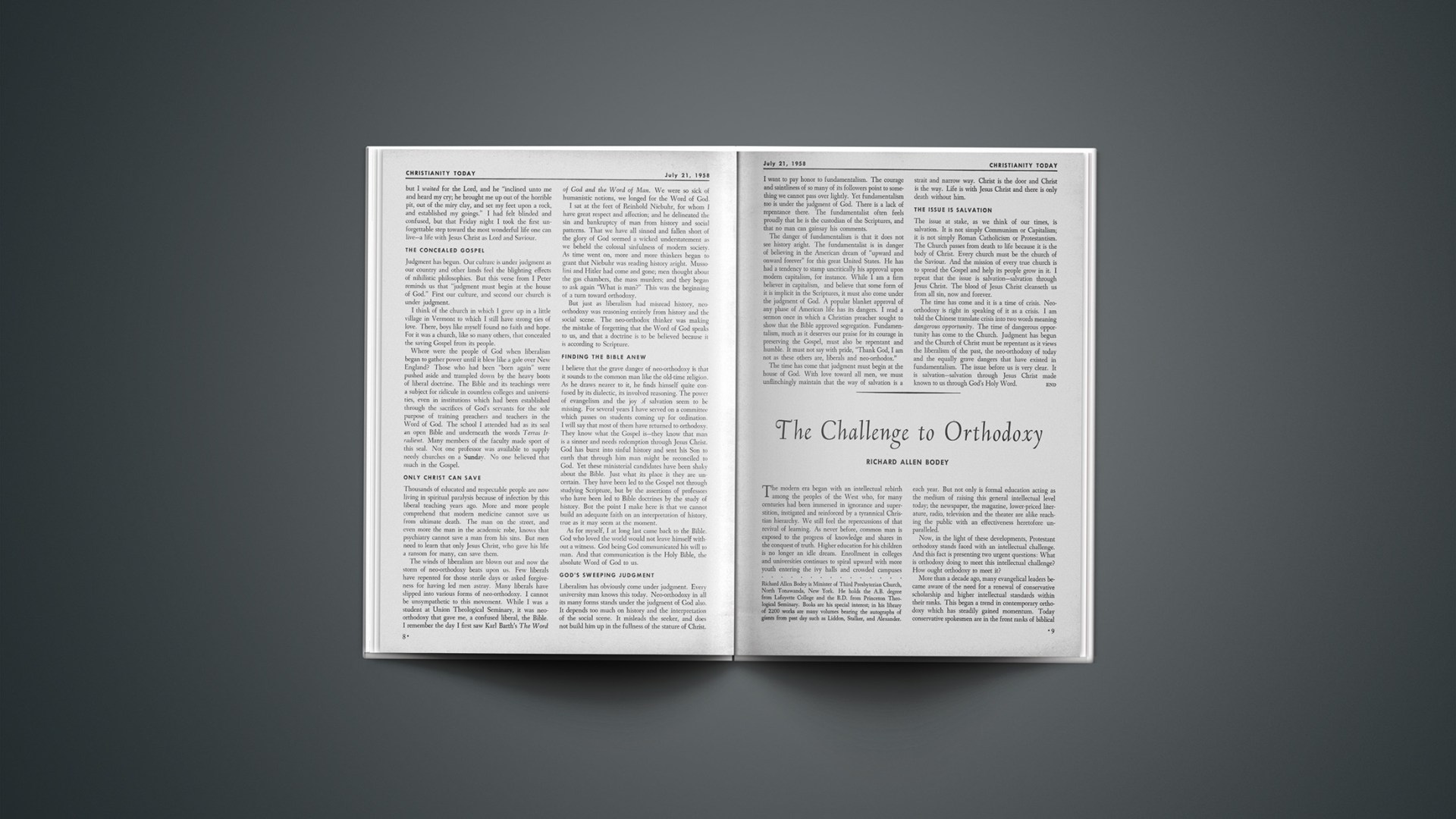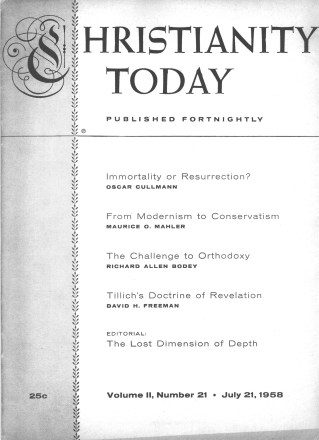The modern era began with an intellectual rebirth among the peoples of the West who, for many centuries had been immersed in ignorance and superstition, instigated and reinforced by a tyrannical Christian hierarchy. We still feel the repercussions of that revival of learning. As never before, common man is exposed to the progress of knowledge and shares in the conquest of truth. Higher education for his children is no longer an idle dream. Enrollment in colleges and universities continues to spiral upward with more youth entering the ivy halls and crowded campuses each year. But not only is formal education acting as the medium of raising this general intellectual level today; the newspaper, the magazine, lower-priced literature, radio, television and the theater are alike reaching the public with an effectiveness heretofore unparalleled.
Now, in the light of these developments, Protestant orthodoxy stands faced with an intellectual challenge. And this fact is presenting two urgent questions: What is orthodoxy doing to meet this intellectual challenge? How ought orthodoxy to meet it?
More than a decade ago, many evangelical leaders became aware of the need for a renewal of conservative scholarship and higher intellectual standards within their ranks. This began a trend in contemporary orthodoxy which has steadily gained momentum. Today conservative spokesmen are in the front ranks of biblical and theological scholarship, and are creating reliable and authoritative literature being published not only by evangelical publishers, but well-known firms of long standing. Evangelicals who have won distinction in the fields of dogmatics, apologetics, ethics, biblical studies, philosophy, history and archeology are increasing. Colleges and especially theological seminaries in the orthodox tradition—Westminster, Calvin, Fuller, and Concordia (to mention a few), are fully recognized in academic circles as scholarly institutions with superior standards. The evangelical pulpit is also meeting the intellectual challenge and giving its message new impact.
It must be admitted that earlier in the twentieth century the prevailing winds of orthodoxy were not of this temper; nor has this intellectual rebirth yet enlisted universal enthusiastic support. Some time ago I attended a meeting of the friends and supporters of a metropolitan Bible institute, at which the president of the institution outlined an ambitious program for the school’s future development, one phase of which was academically oriented. Immediately after his remarks, a clergyman, representing a well-known evangelical tradition, expressed alarm at the academic proposals and passionately protested the growing tendency within orthodoxy to attain higher intellectual status. He did this simply on the basis of general principles, and among that assembly of clergy and laity, many supported him.
The incident reflects the mood and spirit of much that passed for orthodoxy several decades prior to the revival of which we now speak. Orthodoxy in general was beating a retreat from the intellectual scene. There were significant exceptions of course; not every college, seminary, and pulpit within the tradition had plunged into the dismal abyss of anti-intellectualism. Nevertheless, anti-intellectualism was the prevailing climate, and it was evidenced by a noticeable dearth of scholarly publications in most areas of theological and biblical disciplines. It was also evidenced in a decline in provocative and penetrating preaching, and a widespread uncritical acceptance of grossly inferior, deplorable music. Apart from appeals to a handful of eminent scholars like J. G. Machen, conservatives habitually took theological refuge in the masters of the past. Even to the present hour there are those who, rather than sharpen their wits to the combat of ideas themselves, prefer to resurrect their grandfathers, great grandfathers, and great, great grandfathers, and speed them to the front lines to challenge Barth, Brunner, Niebuhr, Tillich, and contemporary biblical critics. Happily such reactionary persons are no longer the foremost representatives of orthodoxy, and it is to be hoped that their kind will not long survive.
Anti-intellectualism grew out of two erroneous conceptions. On the one hand many conservatives, if not deliberately, then unwittingly, failed to perceive that truth, though absolute, is not static but dynamic. God’s revelation of eternal truth in his Word is addressed to man’s reason and has been cast in concrete, conceptual, verbal form. There is abundant witness in the Scriptures to the fact of revealed doctrines. We know that doctrines are not merely the vehicles of truth; they are themselves truth. Nevertheless, how are we to conclude that our conquest and understanding of this truth are complete? Hodge, Kuyper, Warfield, and Machen did not scale the last heights and thus leave to posterity the vain luxury of idleness. The Spirit of God is still at work to enlighten the mind; he merely bids us keep step with him.
On the other hand, conservatives were inclined to misinterpret the role of the intellect and its relation to the Christian gospel and life. They all too often overemphasized the emotional and volitional implications of the Gospel and repudiated, if not in principle then in practice, the doctrine of “the primacy of the intellect.” As Gordon Clark pointed out so well in his article “Faith and Reason” (CHRISTIANITY TODAY, Vol. I, issues 10 and 11), the biblical term “heart” has been given an almost exclusively emotional interpretation, inconsistent with scriptural usage. To underrate the intellect is neither good psychology nor good theology.
While orthodoxy weltered in this mire of anti-intellectualism, modernism preened its feathers, boasted its superior knowledge, and assumed an air of sophistication. Then with the force of an avalanche, charges of obscurantism and irrelevance descended upon orthodoxy and drove it into the intellectual revival we are having now. Sober-minded conservatives, therefore, became bent on vindicating and restoring the rightful respectability of their theological position and emancipating it from a terrible and vicious bias. To this point, they have succeeded, and their efforts merit the highest commendation.
Warning Of Peril
But this reaction is also fraught with peril. Orthodoxy will go too far in the opposite direction if intellectual respectability becomes an end in itself. In fact, orthodoxy could wind up in a cloister.
There is a lesson to be learned here from neo-orthodoxy which, in the opinion of many, is proving itself an arid intellectualism. The writer recollects his own strenuous tussle in seminary with the complicated lines of reasoning from leading exponents of the new theology. He has also listened to frequent complaints from students and pastors that their study of neo-orthodox literature leaves them with not the slightest idea of the authors’ meaning. Some even question whether the authors understand themselves. For this reason, if for no other, the new theology has failed to reach even the informed layman. Many a neo-orthodox preacher addresses himself to a congregation of “wholly other” convictions, and does so without creating a rift simply because the congregation cannot understand him. The curse or the blessing—depending on one’s viewpoint—of neo-orthodoxy has become its extreme intellectualism which cuts off understanding from the common man.
In their mad scramble to regain intellectual status, therefore, some orthodox scholars are beginning to travel this same dangerous road. As one reads the latest evangelical books in theology and related fields, he senses a calculated abstruseness on the part of some authors. One also meets the initial formulation of what may in time become an extensive esoteric vocabulary, or just plain suicide.
It is true that evangelicals are caught in the web of a difficult problem that is not of their making. Modern theological thought, as noted above, is exceedingly complex and employs a highly specialized, often ambiguous vocabulary and method of expression. Obviously, anyone who proposes to combat and wrestle effectively with modern theology has to meet it on its own terms. But this is no excuse for a deliberate counter obscurity of expression which at bottom is petty imitation.
There can be no doubt that orthodoxy ought to vindicate its title to intellectual esteem. To veer away from the intellectual challenge of today is to betray Jesus Christ. The New Testament evangelists supply indisputable evidence that in the days of his flesh Jesus appealed to intellectuals. In John, chapter 3, Nicodemus is designated “the teacher of Israel,” which suggests that he was a man of superior learning and ability. The scribes repeatedly joined the ranks of Jesus’ listeners, not only to accumulate legal evidence against him, but also because they found intellectual stimulus and inspiration in his teaching.
St. Paul was an intellectual giant. His epistles are ample proof of genuine competence. Had he been a man of lesser stature, he would not have attracted his Athenian audience on Mar’s Hill. The Church Fathers followed in the train of the Master and his chief apostle. And what shall we say of the Protestant Reformers and the orthodox spokesmen of the still more recent past? Luther, Calvin, Wesley, Edwards, Orr, Denney, Hodge, Kuyper, Warfield—these and scores of others were scholars of the first order.
But there is something else we cannot overlook. Beginning with our Lord and continuing down through the centuries—with the exception of the Dark Ages (and widespread ignorance was one reason for the darkness)—scholars of orthodoxy diligently sought rapport with the common man. They were not pedants. Their scholarship was not of the flamboyant kind. Their aim was to persuade men of the truth of their doctrine by use of rational arguments which could be understood, and thus their intellectual efforts were entirely subservient to the furtherance of the Gospel. This tradition, this and no other, is precisely the need of the hour.
The time has come for conservatives to re-examine both motives and objectives in regard to this renewal of intellectual concern. Without our knowing it, intellectualism per se could become the goal and driving spirit. If this happened, if all we wanted was to wave the banner of intellectuality, then we would be guilty of both treason and idolatry. As a preventative to this, we ought to remind ourselves that claiming the truth wherever we can find it, enlarging our own understanding of it, and communicating it to the man in the pew and the man on the street in intelligible terms is irrevocably our responsibility. And it is a large one.
This means, of course, that we have a corollary responsibility of raising the intellectual level of the evangelical laity which, in many instances, is still pitifully low. At the same time we engage in the thought tensions confronting us, pseudo Christian and non-Christian, we ought earnestly to seek simply to be understood by those in the many walks of life. This cannot be done without humility; humility is a prerequisite for Christian discipleship. “Except ye be converted, and become as little children, ye cannot enter into the kingdom of heaven.” It was in those words that Jesus demanded humility of the arrogant disciples. He is still demanding it of his disciples today. If to preserve our dignity we ever capitulate to a barren pseudo intellectualism, our quest for greater relevance will issue in no relevance at all, and our quest for respectability will become utter contemptibility.
Alike To Thee
Lead us, O Father, through our shadowed years,
When life perplexed and perilous appears;
Direct our steps in paths we cannot see,
For light and darkness are alike to Thee.
Teach us the truths we are so slow to gain—
The good of grief, the high reward of pain;
Help us meet bravely earth’s adversity,
For light and darkness are alike to Thee.
When on our lives the final Shade shall fall,
May no doubts daunt us and no fears appall:
Life, death, for us are veiled with mystery,
But light and darkness are alike to Thee.
EFFIE SMITH ELY
Richard Allen Bodey is Minister of Third Presbyterian Church, North Tonawanda, New York. He holds the A.B. degree from Lafayette College and the B.D. from Princeton Theological Seminary. Books are his special interest; in his library of 2200 works are many volumes bearing the autographs of giants from past day such as Liddon, Stalker, and Alexander.










